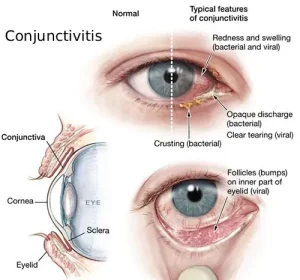Overview
Diagnosis
Diagnosis of conjunctivitis is usually made through a physical examination and medical history review.
Tests may include:
-
Eye examination: The doctor examines the eye with a light and magnifying instrument to look for inflammation.
-
Sample analysis: In severe or chronic cases, a swab of eye discharge may be taken to identify bacteria, viruses, or allergens.
-
Allergy testing: If allergic conjunctivitis is suspected, tests may be done to identify specific allergens.
Treatment
Treatment depends on the cause of conjunctivitis.
1. Viral Conjunctivitis:
-
Usually clears up on its own within 1 to 2 weeks.
-
Cool compresses and artificial tears help relieve irritation.
-
Avoid touching or rubbing the eyes to prevent spreading.
2. Bacterial Conjunctivitis:
-
Treated with antibiotic eye drops or ointments prescribed by a doctor.
-
Symptoms often improve within a few days of treatment.
3. Allergic Conjunctivitis:
-
Managed by avoiding allergens.
-
Antihistamine or anti-inflammatory eye drops can reduce symptoms.
4. Irritant Conjunctivitis:
-
Caused by exposure to chemicals or irritants.
-
Rinse eyes immediately with clean water or saline and avoid further exposure.
Home Remedies and Self-Care
You can ease symptoms and prevent spreading conjunctivitis by following these steps:
-
Use clean tissues or cotton pads to wipe discharge.
-
Wash hands frequently, especially after touching the eyes.
-
Avoid sharing towels, makeup, or eye drops.
-
Replace pillowcases and washcloths daily until recovery.
-
Avoid wearing contact lenses until symptoms fully resolve.
Complications
Though rare, untreated or severe conjunctivitis can lead to:
-
Corneal inflammation (keratitis)
-
Vision problems
-
Spread of infection to other parts of the eye or body
Prompt treatment helps prevent complications and protects eye health.
Prevention
To reduce your risk of developing or spreading conjunctivitis:
-
Practice good hygiene – wash hands often.
-
Avoid touching your eyes unnecessarily.
-
Disinfect contact lenses properly and avoid overuse.
-
Stay home from school or work if you have an active infection.
When to See a Doctor
Seek medical attention immediately if you experience:
-
Eye pain or blurred vision
-
Sensitivity to light
-
Severe redness or swelling
-
Symptoms that worsen or don’t improve within a week
Early diagnosis and treatment can help prevent serious complications and protect your vision.
Advertisement

